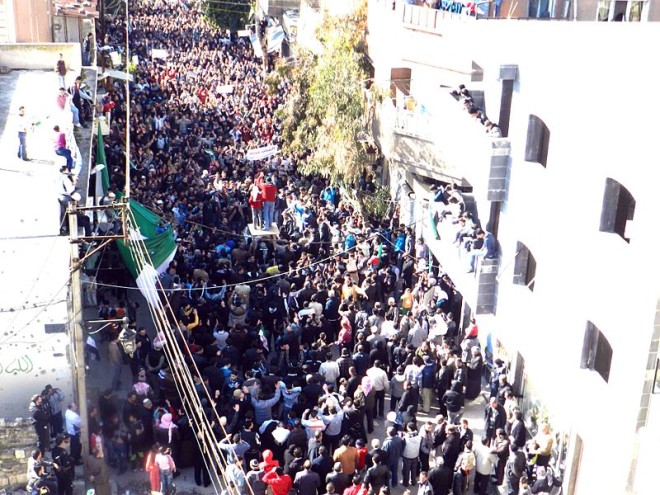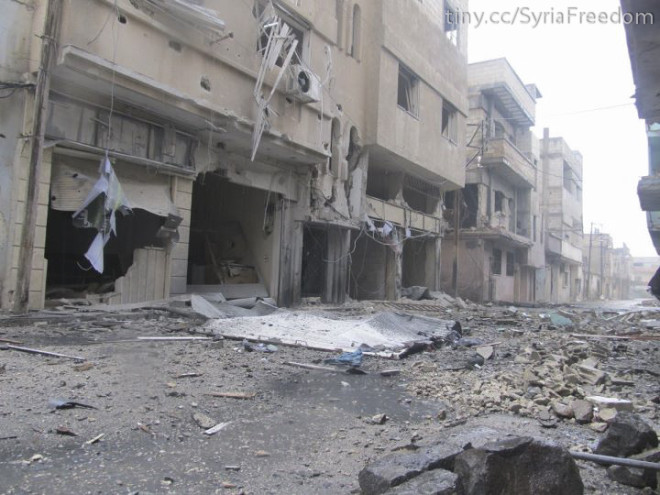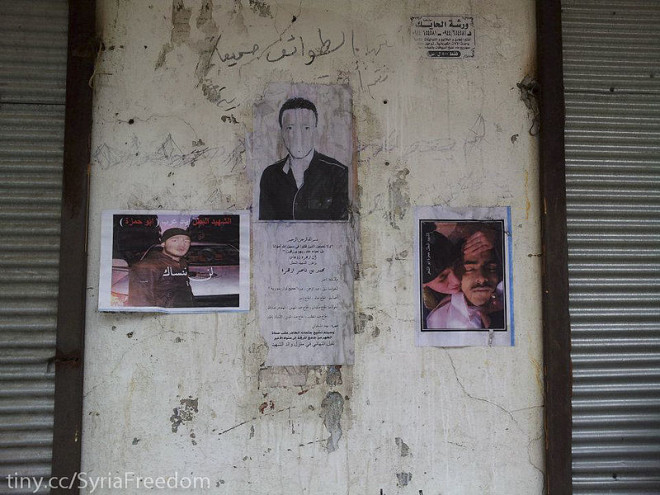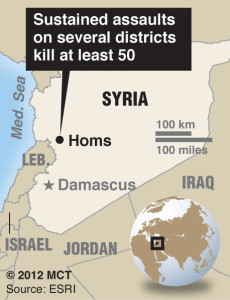An Appeal from the People of Homs, Syria
On Tuesday, two Syrian activists working closely with those in the Red Crescent (Red Cross equivalent) and a Syrian-American student from the besieged city of Homs riveted a crowd of seventy five people for one hour through a three-way video call. Skirting severe media restrictions in the country, the Syrians used the latest weapon in the activists’ toolbox to relate their stories to a diverse group of Wash U students gathered in the Danforth University Center.
From Syrian security forces commandeering a university’s high-rises to use as snipers’ roosts to terrifying excursions for bread by civilians under gunfire and shelling, the Syrians made it clear that Homs was facing collective punishment by the Assad regime for its previous anti-government demonstrations.
Audience members and you, loyal WUPR reader, have the opportunity to ask further questions to the Syrian activists via email. Please email webeditor@wupr.org with your questions and we will do our best to post your question and their responses to them here.
Questions were raised about what the Syrian people needed the most.
- No-fly zone enforced by Syria’s neighbor Turkey for northern Syria. This would allow the opposition Free Syrian Army to set up a basis of operation in the city of Idlib.
- Arming the Free Syrian Army so that they could effectively defend themselves and civilians against Syrian Army tanks and artillery.
- Air superiority is absolutely necessary for effective FSA–thus the no-fly zone
- Absolutely no land-based military intervention by the West. With an Arab force, this becomes a different matter.
The Syrian activists were asked to speak about a possible post-Assad Syria
- Securing a post-revolution leadership is the last of their worries. “We want a government that won’t kill us.”
- Whether the leadership is the Syrian National Council, or whatever it may be, they reject the notion that a Syria must depend on a strong leader, as it has been for the last forty years. They said that this is exactly what they are fighting against.
- If Bashar al-Assad is deposed, free passage and immunity as was guaranteed to Yemeni President Ali Abdullah Saleh is not an option. This would only encourage future tyrants to use violence as a legitimate means of governance.
How can we, American college students, help?
- Spreading the word. There is a reason that journalists are not allowed to broadcast the atrocities being committed in Syria.
- Raise funds and donations for Syrian refugees, and if possible, for Syrians inside Syria.

With traditional outlets blocked by the Syrian government, Syrians are utilizing the power of Youtube and Facebook to get their message out.
Danny Abdul Dayem is a Syrian-British e-activist (using Youtube) who recently escaped from Homs to Lebanon as Syrian troops approached his neighborhood. Here is an interview of him (warning: very graphic footage) by Al Jazeera English, along with a New York Times article with many of his videos; he asks the UN why the people of Homs have abandoned and left to face Bashar al-Assad’s legions alone.
Here is a Facebook page that has regularly uploaded videos and other media by those in Homs as we speak. Even though everything is in Arabic, the videos are worth a thousand words.

There are several ways that you can help the Syrian people’s cause for freedom and justice.
Sign the petition to recognize the Syrian National Council as the legitimate representative of Syria to wrest the nation from the grip of Bashar al-Assad.
Support the only organization that currently has the capacity to bring medical supplies into Syria and information out.
Donate much needed food supplies to Syrians inside the country and Syrian refugees in the bordering countries.
The Syrian American Medical Society has established funds for the cause in Syria. They are currently attempting to reach hospitals in Homs, which, inundated with the wounded and dead, are also desperately low on supplies.

